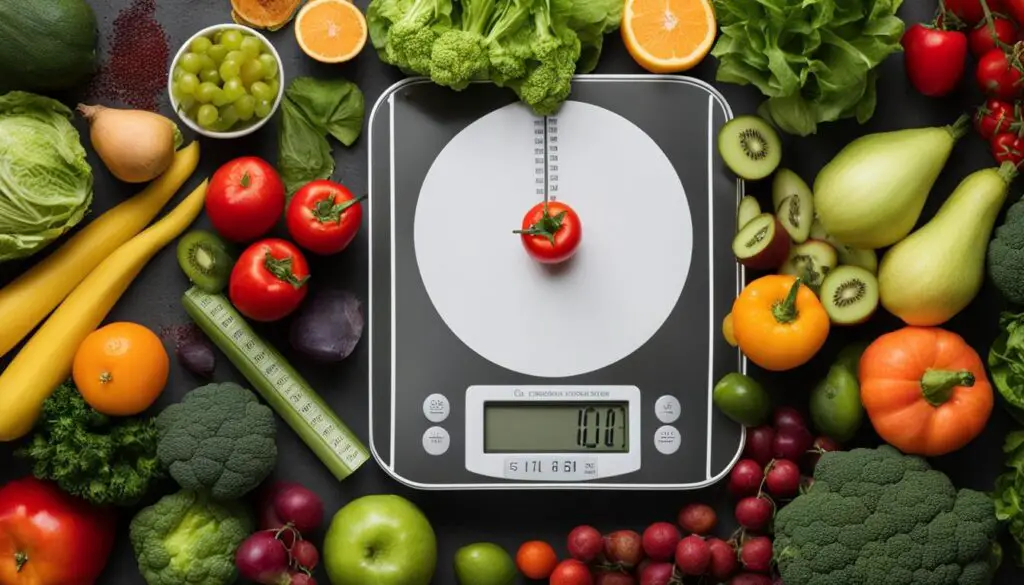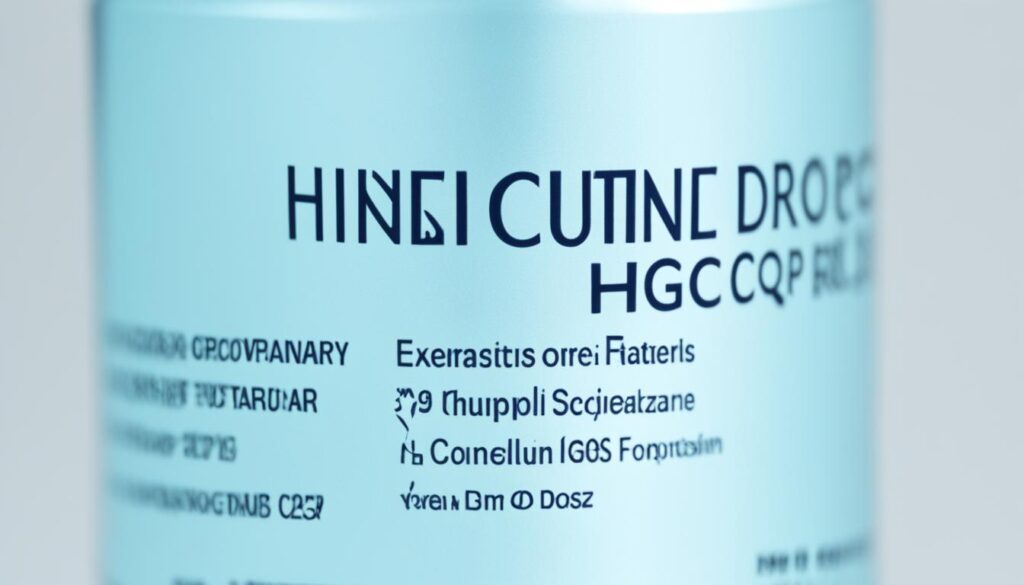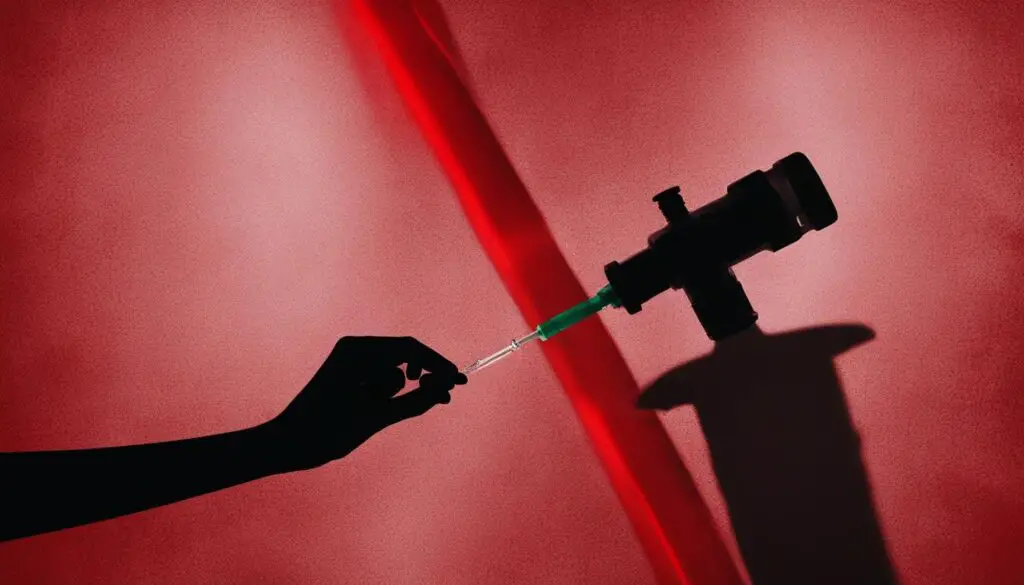Did you know that the HCG diet has gained attention as a method for weight loss? The use of HCG drops, derived from the Human Chorionic Gonadotropin hormone produced during pregnancy, has sparked interest in its potential benefits. The HCG hormone is believed to influence the hypothalamus in the brain, which regulates hunger and metabolism, leading to weight loss. But what are the actual benefits of HCG drops for weight loss, and is it a safe and effective method?
Key Takeaways:
- HCG drops have gained attention as a method for weight loss.
- The HCG hormone is thought to influence the hypothalamus, regulating hunger and metabolism.
- Further research is needed to establish the efficacy and safety of the HCG diet.
- Consultation with a healthcare professional is crucial before starting the HCG diet.
- HCG drops should be taken according to prescribed dosage and administration guidelines.
Understanding HCG
HCG, short for Human Chorionic Gonadotropin, is a hormone traditionally associated with pregnancy. It serves as a vital biological marker during early fetal development, playing a crucial role in the growth and well-being of the embryo. Additionally, HCG is responsible for maintaining the corpus luteum and promoting the production of progesterone, another hormone essential for a healthy pregnancy.
While HCG is primarily recognized for its role in pregnancy, researchers have discovered its potential applications in weight loss. Studies suggest that HCG may have the ability to influence the hypothalamus, a region of the brain responsible for regulating hunger and metabolism. By modulating these physiological processes, HCG could potentially impact fat metabolism and appetite suppression, making it an intriguing candidate in the field of weight loss.
Image:
The HCG Diet Explained

The HCG diet is a structured weight loss program that encompasses three distinct phases: the Loading Phase, Weight Loss Phase, and Maintenance Phase. Each phase plays a vital role in the overall effectiveness and success of the diet.
Loading Phase
The Loading Phase is the initial stage of the HCG diet, during which individuals consume a high-calorie diet for approximately two days. This phase aims to prepare the body for the calorie restrictions that will follow. By indulging in calorie-dense foods, the body is overloaded with energy, allowing it to build up its glycogen stores.
During the Loading Phase, individuals are encouraged to eat foods rich in healthy fats and carbohydrates. This replenishment of glycogen helps stabilize blood sugar levels and prevents excessive hunger during the subsequent phases.
Weight Loss Phase
The Weight Loss Phase is the most crucial phase of the HCG diet. It involves a low-calorie diet, typically ranging from 500 to 800 calories per day, along with daily HCG supplementation. The HCG hormone plays a role in modulating hunger and stimulating fat metabolism, thereby aiding weight loss.
During this phase, individuals follow a specific meal plan that focuses on lean protein, vegetables, and fruits. The reduced caloric intake promotes fat burning and facilitates weight loss. HCG supplementation helps maintain muscle mass and prevents the body from entering a state of starvation.
| Benefits of the HCG Diet | Challenges of the HCG Diet |
|---|---|
| – Rapid weight loss | – Strict calorie restriction |
| – Reduction in visceral fat | – Initial adjustment period |
| – Improved metabolism | – Limited food choices |
| – Increased energy levels | – Potential side effects |
| – Enhanced self-discipline | – Long-term sustainability |
Maintenance Phase
The Maintenance Phase is the final phase of the HCG diet, focusing on stabilizing weight and establishing healthy eating habits for long-term success. During this phase, individuals gradually increase their caloric intake, reintroducing additional food groups while avoiding sugar and starch.
The goal of the Maintenance Phase is to find an individual’s ideal caloric intake, ensuring weight stability while preventing further weight gain. This phase also emphasizes the importance of portion control, mindful eating, and regular exercise to maintain the benefits achieved during the weight loss phase.
It is crucial to approach each phase of the HCG diet with dedication, following the prescribed guidelines and consulting with healthcare professionals when necessary. While the diet can yield significant weight loss results, it is important to consider its limitations and potential challenges to ensure a safe and successful journey towards achieving personal health goals.
How to Do the HCG Diet
Before embarking on the HCG diet, it is crucial to prioritize your health and safety by consulting with a healthcare professional. They can assess your individual health needs and determine if the HCG diet is suitable for you. The guidance of a healthcare provider throughout your journey will ensure the best possible outcomes.
Following the prescribed dosage and administration guidelines for HCG is essential to achieve the desired results. Whether you opt for injections, drops, or pellets, it is important to adhere to the recommended method and dosage. This will optimize the effectiveness of the treatment and minimize any potential risks.
Creating a well-balanced and nutritious meal plan is a key aspect of the HCG diet. It is essential to design a meal plan that aligns with the specified calorie restrictions while providing the necessary nutrients for overall well-being. Opt for lean protein, vegetables, fruits, and limited carbohydrates to ensure a balanced diet that supports your weight loss goals.
Monitoring your progress throughout the HCG diet is crucial for tracking your success and making necessary adjustments. Regularly weigh yourself and keep a journal to record your progress. Pay attention to any changes in your body and overall well-being. If you experience any concerns or adverse effects, promptly discuss them with your healthcare provider.
By following the HCG diet consultation, adhering to the recommended HCG dosage and administration guidelines, creating a well-planned meal plan, and regularly monitoring your progress, you can maximize the potential benefits of the HCG diet.
The Science Behind the HCG Diet

Did you know that the HCG hormone, often associated with pregnancy, has been touted as a weight loss aid? While it may seem surprising, many people believe that introducing HCG into the body can enhance fat metabolism and reduce hunger, leading to significant weight loss. However, the real question is: Does the science support these claims?
Key Takeaways:
- The HCG diet is believed to work by reducing hunger and stimulating fat metabolism. However, more research is needed to establish its efficacy and long-term effects.
- Multiple studies have concluded that weight loss achieved through the HCG diet is primarily due to extreme calorie restriction, not the hCG hormone itself.
- Severe calorie restriction, such as that in the HCG diet, can lead to muscle loss and a slowed metabolic rate.
- It’s essential to consult with a healthcare professional before starting the HCG diet, as there are potential safety concerns and side effects.
- Adopting a sustainable and healthy lifestyle, with guidance from healthcare professionals, is key to long-term weight loss success.
hCG’s Effect on Body Composition
One common side effect of weight loss is the loss of muscle mass. Severe calorie restriction, such as that in the HCG diet, can lead to decreased muscle mass and a slowed metabolic rate.
While proponents of the HCG diet claim that it prevents muscle loss and metabolic slowdown, scientific evidence does not support these claims. Low-calorie diets are not effective for long-term weight loss, as they can lead to increased hunger hormones and reduced energy expenditure.
It is important to prioritize sustainable weight loss methods that focus on preserving muscle mass and maintaining a healthy metabolic rate. Incorporating regular exercise and consuming a balanced, nutritious diet can help achieve long-term weight loss goals without jeopardizing muscle mass or triggering metabolic slowdown.
The Rules of the HCG Diet

When following the HCG diet, it’s important to understand the different phases and guidelines to maximize its effectiveness. The HCG diet consists of three distinct phases – Preparation, Fat Loading, and Caloric Restriction. Each phase serves a specific purpose in facilitating weight loss and supporting overall health.
1. Preparation Phase
The Preparation Phase allows your body to adjust before starting the HCG diet. During this phase, you should consult with a healthcare professional to ensure the diet is suitable for your individual health needs. This is also a good time to familiarize yourself with the calorie restrictions and meal plans for the Weight Loss Phase.
2. Fat Loading Phase
The Fat Loading Phase involves consuming high-calorie foods for two days. This phase prepares your body for the upcoming calorie restrictions and helps improve adherence to the diet. Foods rich in healthy fats, such as avocados, nuts, and olive oil, are encouraged during this phase.
3. Caloric Restriction Phase
The Caloric Restriction Phase is the main phase of the HCG diet, where you will follow a low-calorie intake of around 500-800 calories per day. This phase typically lasts for a specific duration, depending on your weight loss goals. It is crucial to strictly adhere to the approved meal plan during this phase.
Example HCG Diet Meal Plan:
- Lean protein sources such as skinless chicken breast, white fish, and lean cuts of beef
- Fresh vegetables like spinach, lettuce, cucumbers, and tomatoes
- A small portion of fruits such as apples, oranges, and strawberries
- A serving of bread or a carb option like melba toast or grissini
The purpose of the Caloric Restriction Phase is to create a calorie deficit, which promotes weight loss. It’s important to note that the calorie intake during this phase is significantly lower than the average daily recommended intake. Therefore, it is crucial to follow the meal plan and consult with a healthcare professional to ensure this phase is safe for you.
4. Maintenance Phase
The Maintenance Phase is the final phase of the HCG diet. It involves gradually increasing caloric intake while avoiding sugar and starch. This phase is crucial for stabilizing weight loss and establishing healthy eating habits for the long term.
Throughout the HCG diet, it’s important to focus on consuming approved foods that fit within the calorie restrictions of each phase. This will help optimize weight loss and ensure you’re receiving necessary nutrients.
Scam Products on the Market

When it comes to hCG products, it’s important to be wary of scams and false claims. Many hCG products available online, particularly those labeled as homeopathic, do not actually contain any real hCG hormone. These products may promise effortless weight loss, but they lack scientific evidence to support their effectiveness.
The U.S. Food and Drug Administration (FDA) has raised concerns about the safety of hCG products, including both the products themselves and the hCG diet. In fact, the FDA deems these products illegal and dangerous. The use of unregulated hCG products can put your health at risk, as they may contain unknown ingredients that could have adverse effects on the body.
It’s important to note that reported side effects of the hCG diet include headaches, depression, and fatigue. In rare cases, the diet has been linked to the development of blood clots, as demonstrated by a case study. These potential risks highlight the importance of caution when considering hCG products or the hCG diet.
Before embarking on any weight loss journey, it’s crucial to consult with healthcare professionals to ensure your safety and well-being.
Key Points:
- Many hCG products labeled as homeopathic do not contain real hCG hormone.
- The FDA has questioned the safety of both hCG products and the hCG diet.
- Unregulated hCG products can contain unknown ingredients.
- Reported side effects of the hCG diet include headaches, depression, and fatigue.
- A case study linked the hCG diet to the development of blood clots.
Dr. Maria’s Modified Weight Loss Program

Dr. Maria’s WeightLoss Works Program is a modified hCG diet that offers a safer approach for individuals with health conditions. This program provides more flexibility by allowing the inclusion of exercise, which can enhance weight loss results. With a focus on personalized care, Dr. Maria’s program aims to help individuals achieve their weight loss goals through a structured and comprehensive approach.
This modified hCG program consists of four distinct phases:
- Preparation/Detox: This initial phase prepares the body for the weight loss journey. It involves detoxifying the body and setting the stage for the subsequent phases.
- Fat Loading: During this phase, individuals consume foods that are high in healthy fats to support the body’s energy needs during the calorie-restricted phase.
- Calorie Restriction: The Calorie Restriction phase is the core of Dr. Maria’s program. This phase involves following a prescribed low-calorie diet, typically ranging from 500 to 800 calories per day. The length of this phase can vary, lasting anywhere from three weeks to two months, depending on individual goals and progress.
- Maintenance: The Maintenance phase focuses on stabilizing weight and gradually increasing caloric intake. It helps individuals establish healthy eating habits to sustain their weight loss long-term.
Dr. Maria’s WeightLoss Works Program emphasizes the importance of calorie control, as the calorie restriction plays a significant role in achieving weight loss results. By modifying the traditional hCG diet, Dr. Maria’s program offers a comprehensive approach that combines the benefits of hCG with exercise and dietary modifications.
Benefits of Dr. Maria’s WeightLoss Works Program:
- More flexibility with the inclusion of exercise
- Suitable for individuals with health conditions
- Similar weight loss results as the traditional hCG program
- Structured four-phase approach to optimize success
Dr. Maria’s WeightLoss Works Program provides individuals with a safe and effective option for weight loss. By incorporating exercise and modifying the traditional hCG program, this approach offers flexibility and personalized care to help individuals achieve their weight loss goals.
| Program Phases | Description |
|---|---|
| Preparation/Detox | Prepare the body for weight loss journey by detoxifying and priming the system. |
| Fat Loading | Consume high-fat foods to provide energy during the calorie-restricted phase. |
| Calorie Restriction | Follow a low-calorie diet to promote weight loss, typically ranging from 500 to 800 calories per day for a specific length of time. |
| Maintenance | Stabilize weight and gradually increase caloric intake while establishing healthy eating habits. |
Safety and Side Effects

The use of hCG as a weight loss aid has raised safety concerns and highlighted potential side effects. The FDA has not approved hCG for weight loss purposes, and over-the-counter (OTC) hCG products are deemed potentially unsafe. These unregulated products can be ineffective and may contain unknown ingredients, posing risks to the consumer’s health.
Reported side effects of the hCG diet include headaches, depression, fatigue, and in rare cases, blood clots. It is crucial to consider these safety concerns and potential risks associated with hCG products before embarking on the diet.
Table: Comparison of FDA-approved weight loss aids and OTC hCG products
| FDA-Approved Weight Loss Aids | OTC hCG Products |
|---|---|
| Undergo rigorous testing for safety and efficacy | Not approved by the FDA for weight loss |
| Regulated by the FDA | Unregulated |
| Clear indication of ingredients and dosage | Potential inclusion of unknown or harmful ingredients |
| Subject to ongoing monitoring and safety updates | No standardized safety protocols |
It is essential to prioritize your health and consult with a healthcare professional before considering any weight loss program that involves hCG or other products not approved by the FDA.
Always remember that the guidance of a healthcare provider is invaluable in selecting safe and effective weight loss strategies.
Tools for Success
![]()
To enhance the success of the HCG diet or any weight loss program, there are several tools that can be helpful. Keeping track of weight and measurements can provide motivation and allow for progress monitoring. Tracking food and supplements helps ensure adherence to the diet plan. Additional resources, such as recipes for hCG-approved meals and soups, can provide variety and flavor options.
Weight and Measurement Tracking
Recording your weight and measurements regularly is a powerful tool for tracking your progress on the HCG diet. By keeping a record of your weight loss journey, you can visualize your success and stay motivated. Use a notebook, an app, or a spreadsheet to document your weight and measurements, such as waist, hips, and thighs. This visual representation of your progress can help you stay on track and celebrate your achievements along the way.
Food and Supplement Tracking
Tracking your daily food intake and supplements is crucial for maintaining the strict calorie restrictions of the HCG diet. You can use a food diary or a mobile app to log your meals, snacks, and beverages. This will help you stay accountable and ensure that you are following the recommended HCG diet guidelines. Additionally, tracking your supplement intake, such as HCG drops or injections, will help you stay consistent and manage your weight loss progress effectively.
Recipes for Variety and Flavor
Following a strict diet can sometimes become monotonous and lead to boredom with your meals. To prevent this, look for hCG-approved recipes that offer variety and flavor while still adhering to the diet plan. Incorporating different ingredients and creative cooking techniques can make your meals enjoyable and satisfying. Experiment with recipes for hCG-approved meals, snacks, and soups to add excitement to your diet and keep you motivated on your weight loss journey.
| Benefits of Weight and Measurement Tracking | Benefits of Food and Supplement Tracking | Benefits of Recipes for Variety and Flavor |
|---|---|---|
|
|
|
Conclusion
The HCG diet offers potential benefits for weight loss, but it is crucial to approach it with caution. While some studies suggest positive outcomes, the long-term efficacy and safety of the HCG diet are still under investigation. Therefore, it is important to consult with healthcare professionals before embarking on any weight loss program.
Sustainable weight loss requires more than just a quick fix. Adopting a healthy lifestyle that includes a balanced diet, regular exercise, and proper guidance from healthcare professionals is essential for long-term success. While the HCG diet may provide initial weight loss, maintaining these results often requires sustained lifestyle changes.
It is important to note that the HCG diet involves extreme calorie restriction, which may not be suitable for everyone. The limitations of this diet, including potential muscle loss and metabolic slowdown, must be taken into consideration. Prioritizing the overall well-being and preserving muscle mass are important factors to consider in any weight loss journey.
To achieve sustainable weight loss and a healthy lifestyle, it is recommended to work closely with healthcare professionals who can provide personalized guidance and support. They can help determine the most appropriate and safe weight loss strategy based on individual needs and goals. Remember, making informed decisions and prioritizing long-term well-being is key to achieving and maintaining weight loss.
FAQ
What is the HCG diet and how does it work?
The HCG diet is a weight loss method that involves three phases – Loading, Weight Loss, and Maintenance. It combines a low-calorie diet with HCG supplementation, a hormone believed to influence hunger and fat metabolism.
Is the HCG diet safe?
The safety of the HCG diet is still being studied, and it is important to consult with a healthcare professional before starting. Following the prescribed dosage and administration guidelines is crucial for safety.
How long does the Weight Loss phase of the HCG diet last?
The duration of the Weight Loss phase can vary depending on individual goals, but it typically lasts from three weeks to two months.
Does the HCG hormone promote fat loss and suppress hunger?
Multiple studies have concluded that weight loss on the HCG diet is primarily due to extreme calorie restriction, not the HCG hormone itself. Therefore, the main mechanism behind weight loss is the significant reduction in calories.
Does the HCG diet prevent muscle loss?
Scientific evidence does not support claims that the HCG diet prevents muscle loss. Severe calorie restriction, such as that in the HCG diet, can lead to decreased muscle mass and a slowed metabolic rate.
What are the phases of the HCG diet?
The HCG diet consists of three phases – Loading, Weight Loss, and Maintenance. The Loading phase involves consuming high-calorie foods, while the Weight Loss phase includes a low-calorie diet with HCG supplementation. The Maintenance phase focuses on stabilizing weight and gradually increasing caloric intake.
Are there any side effects of the HCG diet?
Reported side effects of the HCG diet include headaches, depression, fatigue, and in rare cases, blood clots. It is important to consider potential risks and consult with a healthcare provider before starting the diet.
Are there any safe alternatives to the traditional HCG diet?
Dr. Maria’s WeightLoss Works Program is a modified version of the traditional HCG diet that offers more flexibility and includes exercise. This program may be considered safer for individuals with health conditions and provides similar weight loss results to the traditional HCG program.
Are hCG products regulated and safe?
Many hCG products available online are labeled as homeopathic and do not actually contain any real hCG. The FDA considers both hCG products and the hCG diet to be potentially unsafe and illegal. It is important to avoid unregulated products that can contain unknown ingredients.
What tools can help enhance the success of the HCG diet?
Tools such as tracking weight and measurements, monitoring food and supplements, and using hCG-approved recipes can enhance the success of the HCG diet and provide motivation and variety.
Is the HCG diet a long-term solution?
The long-term efficacy and safety of the HCG diet are still being studied. Adopting a sustainable and healthy lifestyle, with guidance from healthcare professionals, is key to long-term weight loss success.




